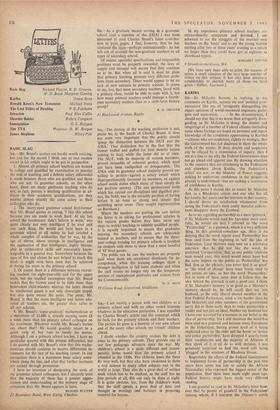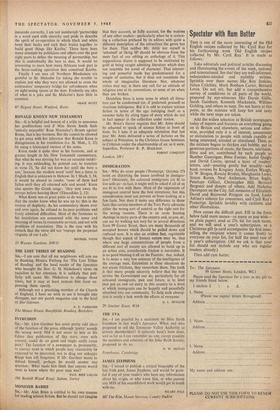KARIBA
SIR.—Sir Malcolm Barrow, in replying to my comments on Kariba, accuses me and 'political com- mentators' like me, of 'arrogantly disregarding the expert opinions of world-renowned engineers, geolo- gists and economists. . . In the circumstances, I should say that this is no worse than arrogantly disre- garding, as Sir Malcolm is doing, the doubts and misgivings of a number of Federal citizens (including some whose feelings are based on personal and expert knowledge of the conditions appertaining to Kariba) —citizens who are suspicious, rightly or wrongly, that the Government has not disclosed to them the whole truth of the matter. If these doubts and suspicions can be allayed by a commission of inquiry, then I am at a loss to see why the Federal Government does not go ahead and appoint one. By drawing attention to the rumours that are circulating in the Federation and elsewhere about Kariba, 'the Federation's critics' are not, as the Minister of Power suggests, seeking to undermine confidence in the project—it already is undermined—but are seeking a restoration of confidence in Kariba.
At this point I should like to assure Sir Malcolm that, as a Rhodesian citizen and one who has all her family, her assets and her interests in that country, I should derive no satisfaction whatsoever from seeing the Federation's most costly material achieve- ment disappear down the Zambesi.
As to my regarding partnership as a mere 'gimmick,' if Sir Malcolm would read his Spectator more care- fully, he would see that I referred to 'the word "Partnership"' as a gimmick, which is a very different thing. In this gimmick-conscious age, there is no denying that the word, repeat word 'Partnership' has been used from the beginning to 'sell' the idea of Federation. Lord Malvern once said on a television interview that he did not like the word, he preferred 'Co-operation,' but, as any public relations man would aver, this word would never have had the same impact on the public as 'Partnership' has bad. Just as the phrases 'you never had it so good' or 'the wind of change' have been freely used to put across an idea, so has the word 'Partnership,' but in none of these cases does it follow that the idea behind the gimmick is not a good one. 1 think if Sir Malcolm's memory is as good as a Minister's memory should be, he will recall that, my late husband, as the only liberal elected member in the first Federal Parliament, tried a lot harder than he (Sir Malcolm) and other members of the government party did in those early days to make partnership a reality and not just an ideal. Neither my husband nor I have ever wavered for a moment in our belief in the idea of partnership, but I still maintain the word has been used as a gimmick and because many Europeans in the Federation, having grown tired of it being explained away as 'the rider and the horse' or 'senior and junior partnership,' have dropped it quietly from their vocabularies and the majority of Africans if they speak of it at all do so with derision. I was genuinely surprised to find the word still being 'plugged' in the windows of Rhodesia House.
Regrettably the efforts of the Federal Government to implement forms of partnership in the past two years have come too late to satisfy the African Nationalists who represent the biggest sector of the population. Had these been made eight years ago, Federal history might have made very different reading.
I am grateful to read in Sir Malcolm's letter how- ever that 'to people of goodwill in the Federation' (among whom, if 1' interpret the Minister's subtle
innuendo correctly, I am not numbered) 'partnership is a word used with sincerity and pride to describe the spirit of co-operation in which black and white bend their backs and rack their brains together to build great things like Kariba.' There have been many attempts by politicians and others over the past eight years to define the meaning of partnership, but this is undoubtedly the best to date. It would be interesting to learn how many Africans took part in the brain-racking operation that conceived Kariba.
Finally I am sure all Northern Rhodesians are grateful to Sir Malcolm for taking the trouble to explain just why they were not allowed to cross the contractors' temporary bridge for refreshment when on sight-seeing sprees at the dam. Evidently my idea of what is a joke and Sir Malcolm's have little in common.
GRACE SCOTT 67 Regent Street, Watford, Herts















































 Previous page
Previous page